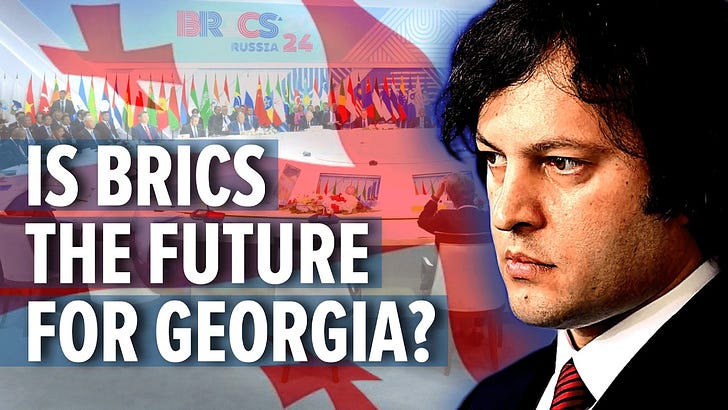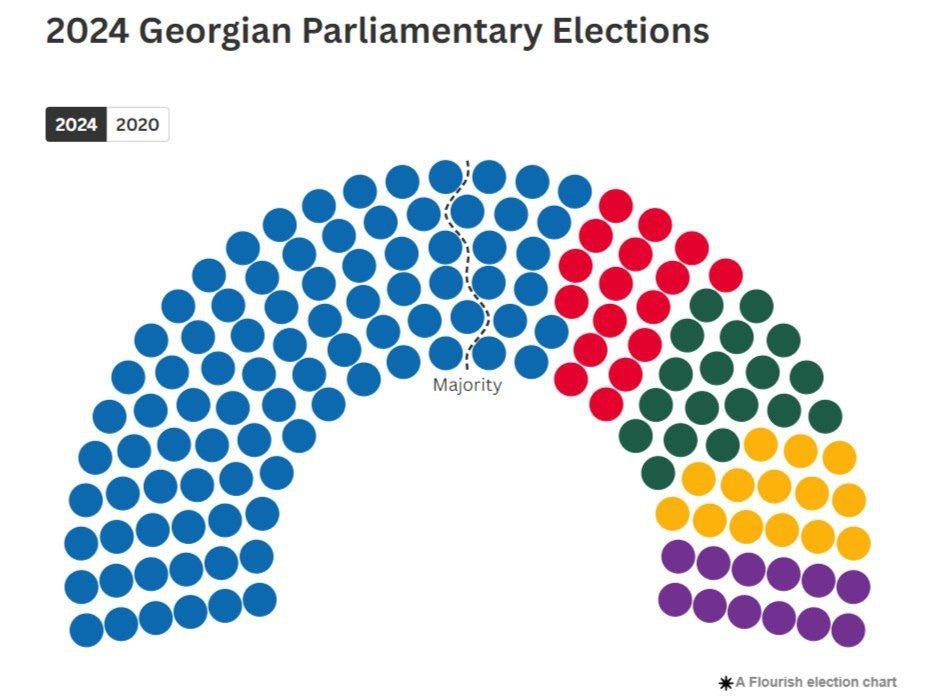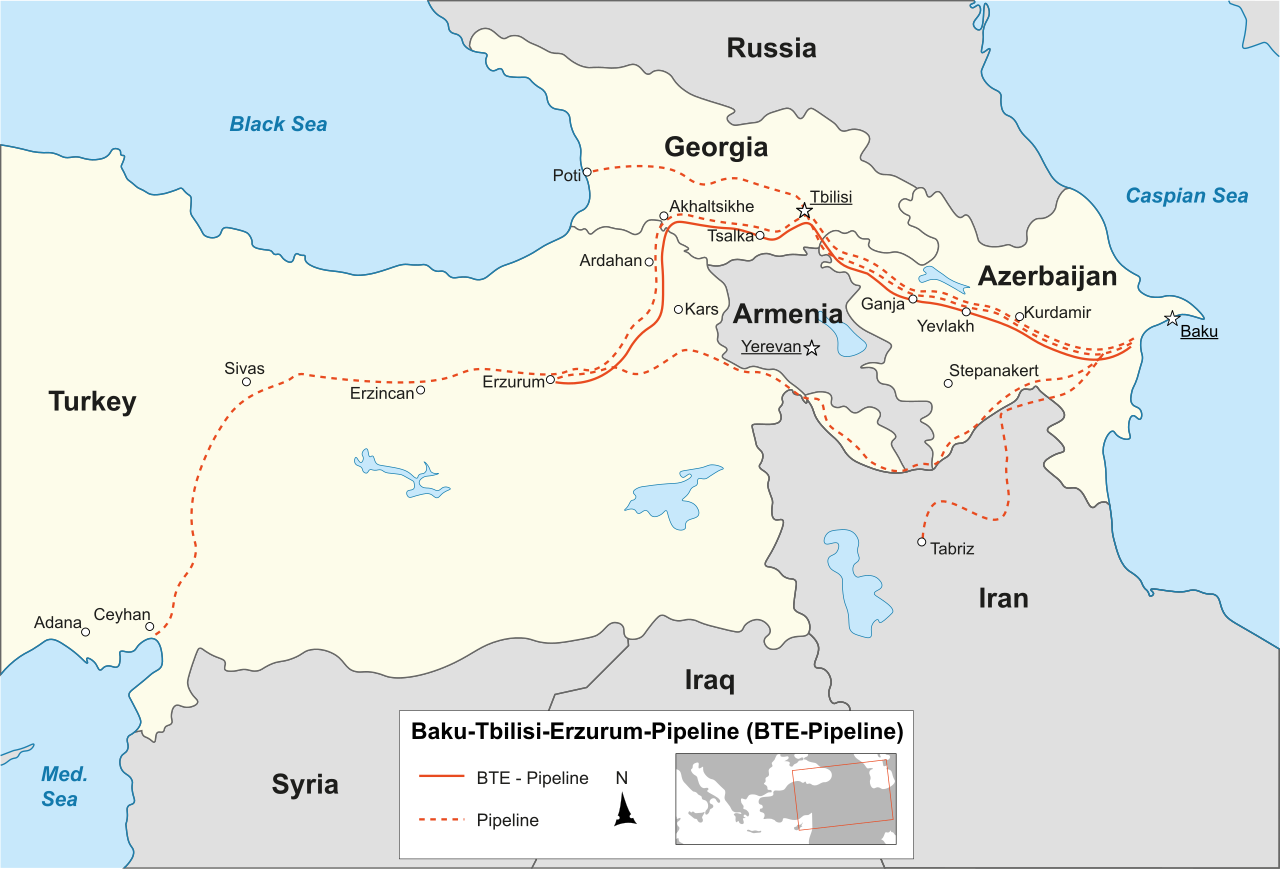Is It Time for Georgia to Think About BRICS?
In the swirling political storm that has engulfed Georgia, a provocative question emerges: Could BRICS be the lifeline Georgia needs in its moment of geopolitical uncertainty?
A provocative question has emerged in the swirling political storm that has engulfed Georgia since its contested parliamentary elections on October 26, 2024: Could the BRICS be the lifeline that Georgia needs during geopolitical uncertainty?
The nation finds itself at a critical crossroads. After years of courting European Union membership, Georgia has suddenly hit a roadblock that's shaking its political foundations to the core. Prime Minister Irakli Kobakhidze's announcement to delay EU negotiations until 2028 has ignited a firestorm of protests in Tbilisi, revealing deep fractures in the country's political landscape.
But amidst the chaos, there's a tantalizing alternative on the horizon: the BRICS alliance.
A Country in Turmoil
Let's set the scene. Georgia's streets are alive with tension. Protesters flood the capital, angry about the government's decision to push back EU membership talks. The ruling Georgian Dream party, which secured nearly 54% of the vote, stands firm. They're rejecting what they see as European "blackmail" and demanding dignity in their international negotiations.
President Salome Zourabichvili, herself a French-born diplomat, has gone as far as calling the elections a "Russian-style" operation, she won't accept the legitimacy of the new parliament and declared that it can't choose her successor. But she didn't just make statements; she also encouraged mass protests. Over 250 people have been arrested, and things are really starting to heat up politically.
Enter BRICS: A Potential Game Changer
So why might BRICS be an attractive alternative? The alliance represents 23 emerging economies committed to challenging Western global dominance. For Georgia, this could be more than just an economic opportunity—it could be a strategic lifeline.
Consider the potential benefits. BRICS offers:
New market access
Infrastructure development opportunities
A platform for greater diplomatic leverage
A chance to reduce dependency on Western alliances
Georgia's economy, which currently relies heavily on agriculture, tourism, and remittances, could find fresh momentum through BRICS partnerships. These nations are investing heavily in infrastructure across the Global South, presenting Georgia with a chance to upgrade its infrastructure without the typical political strings attached by Western powers.
Strategic Positioning
Georgia's unique geographical location—straddling Europe and Asia—has always been its strategic trump card. Historically a buffer between empires, the country now sits at an intriguing geopolitical intersection. The South Caucasus pipeline, which transports natural gas from Azerbaijan to Europe, runs through Georgia, making it a key player in energy security.
While the Georgian Constitution leans towards Euro-Atlantic aspirations, the current government's priorities suggest a more pragmatic approach. They're focused on "peaceful restoration of territorial integrity"—a subtle reference to potential reunification with Abkhazia and South Ossetia.
A Multipolar World Beckons
Prime Minister Kobakhidze's rhetoric is telling. "We are not going to join the European Union by begging and standing on one leg," he declared. This statement reflects a growing sentiment: Georgia wants to chart its own course.
BRICS represents a multipolar world where emerging economies can assert their sovereignty. For Georgia, this could mean:
Reduced external pressures
More balanced international relationships
A platform to amplify its voice on the global stage
Not a Guaranteed Path
It's crucial to note that Georgia has not officially expressed interest in BRICS. Membership remains purely speculative. However, the current geopolitical climate suggests it might be worth exploring.
Russia seems cautiously pleased with Georgia's EU talks pause, viewing closer Western ties as a threat. The EU, meanwhile, sees Georgia as a critical barrier against Russian influence. But these traditional power dynamics are shifting.
The Bottom Line
Georgia stands at a crossroads. The EU path seems increasingly complicated, fraught with political conditions and potential compromises. BRICS offers an alternative narrative—one of sovereignty, economic cooperation, and independent growth.
The era of a multipolar world has arrived. Georgia now has a chance to shape its destiny, rather than being pushed and pulled by distant powers.
Is it time for Georgia to seriously consider BRICS? The answer might just be a resounding yes.







When the Caucuses were occupied in the time of Catherine the Great, the British Empire found the area to be a prime location to mess with Russia much as they do in the recent times with the various color revolutions they've run. in the 1830's the British deployed David Urquhart (one of Karl Marx's handlers) to stir up the tribes in the area and arm them for a conflict with Russia that resulted in a million ultimately killed before the uprising was put down. General Dudayev after getting assistance from the Bush administration and Thatcher launched the two 1990's wars using Afghanistan Jihadi assets that resulted in a humiliating defeat for the ailing Soviet Union. In 2008 the Soros/NED funded Rose Revolution which put Mikhail Saaskashvili in the presidency from which he began a war in South Ossetia against Russian UN troops which had been there from 1994. The recent provocations are no different. Of course the BRICS would mean a much more fair and equitable situation for Georgia but the area has traditionally been used for destabilization purposes.
Everyone should join BRICS, even here in Australia.